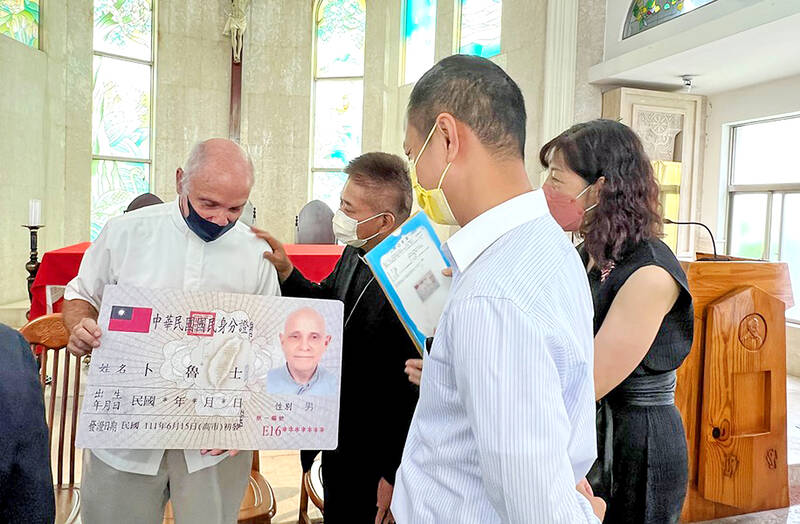A plan to relax regulations on naturalization processes advanced yesterday, with the Executive Yuan approving proposed amendments to the Nationality Act (國籍法), including provisions to protect children’s rights, a reduction of the wait period to two years and waiving fees for exceptional applicants.
The Ministry of the Interior’s proposed amendments are part of the government’s efforts to attract and retain foreign talent.
The act stipulates that foreigners have to have stayed in Taiwan for at least 183 days per year for three or five consecutive years, depending on circumstances, to start the naturalization process, but the amendment would lower the requirement to two years.

Photo courtesy of the Kaohsiung City Government
The ministry said that all fees in the naturalization process — totaling NT$1,200 — would be waived for foreigners who have contributed to the medical field, social welfare, education and other fields in Taiwan.
The proposed amendments would also change all mentions of “unmarried and underaged foreigners” to “unmarried and those under the age of 18” to reflect a revision to the Civil Code stipulating that the age of majority in Taiwan is 18, it said.
Children without a nationality are eligible for naturalization alongside their parents, but the act would be amended to allow social welfare establishments and other facilities to be guardians, ensuring that stateless children would be included, the ministry said.
The proposed changes also take into account articles of the Public Officials Election and Recall Act (公職人員選舉罷免法), it said.
The amendments would remove public officials who represent indigenous areas from office if they hold dual nationalities, it said.
Premier Chen Chien-jen (陳建仁) said that the amendments would help Taiwan observe the spirit of the UN Convention on the Rights of the Child and provide a resolution for stateless children in Taiwan.
Taiwan ratified the convention in 2014 and signed an Instrument of Accession in 2016, despite not being an official signatory to the UN convention.

DEFENDING DEMOCRACY: Taiwan shares the same values as those that fought in WWII, and nations must unite to halt the expansion of a new authoritarian bloc, Lai said The government yesterday held a commemoration ceremony for Victory in Europe (V-E) Day, joining the rest of the world for the first time to mark the anniversary of the end of World War II in Europe. Taiwan honoring V-E Day signifies “our growing connections with the international community,” President William Lai (賴清德) said at a reception in Taipei on the 80th anniversary of V-E Day. One of the major lessons of World War II is that “authoritarianism and aggression lead only to slaughter, tragedy and greater inequality,” Lai said. Even more importantly, the war also taught people that “those who cherish peace cannot

STEADFAST FRIEND: The bills encourage increased Taiwan-US engagement and address China’s distortion of UN Resolution 2758 to isolate Taiwan internationally The Presidential Office yesterday thanked the US House of Representatives for unanimously passing two Taiwan-related bills highlighting its solid support for Taiwan’s democracy and global participation, and for deepening bilateral relations. One of the bills, the Taiwan Assurance Implementation Act, requires the US Department of State to periodically review its guidelines for engagement with Taiwan, and report to the US Congress on the guidelines and plans to lift self-imposed limitations on US-Taiwan engagement. The other bill is the Taiwan International Solidarity Act, which clarifies that UN Resolution 2758 does not address the issue of the representation of Taiwan or its people in

US Indo-Pacific Commander Admiral Samuel Paparo on Friday expressed concern over the rate at which China is diversifying its military exercises, the Financial Times (FT) reported on Saturday. “The rates of change on the depth and breadth of their exercises is the one non-linear effect that I’ve seen in the last year that wakes me up at night or keeps me up at night,” Paparo was quoted by FT as saying while attending the annual Sedona Forum at the McCain Institute in Arizona. Paparo also expressed concern over the speed with which China was expanding its military. While the US

‘FALLACY’: Xi’s assertions that Taiwan was given to the PRC after WWII confused right and wrong, and were contrary to the facts, the Ministry of Foreign Affairs said The Ministry of Foreign Affairs yesterday called Chinese President Xi Jinping’s (習近平) claim that China historically has sovereignty over Taiwan “deceptive” and “contrary to the facts.” In an article published on Wednesday in the Russian state-run Rossiyskaya Gazeta, Xi said that this year not only marks 80 years since the end of World War II and the founding of the UN, but also “Taiwan’s restoration to China.” “A series of instruments with legal effect under international law, including the Cairo Declaration and the Potsdam Declaration have affirmed China’s sovereignty over Taiwan,” Xi wrote. “The historical and legal fact” of these documents, as well